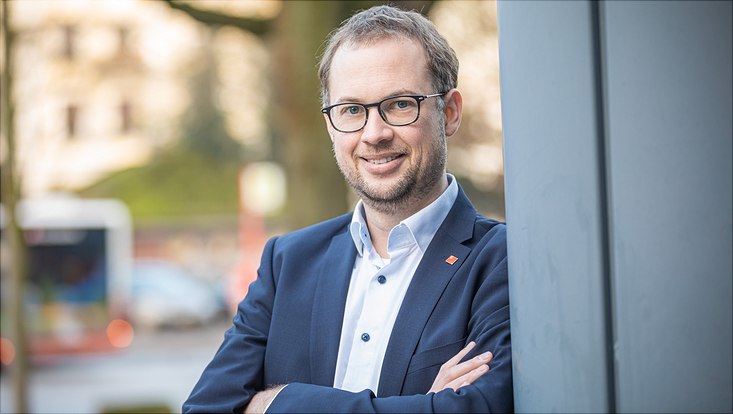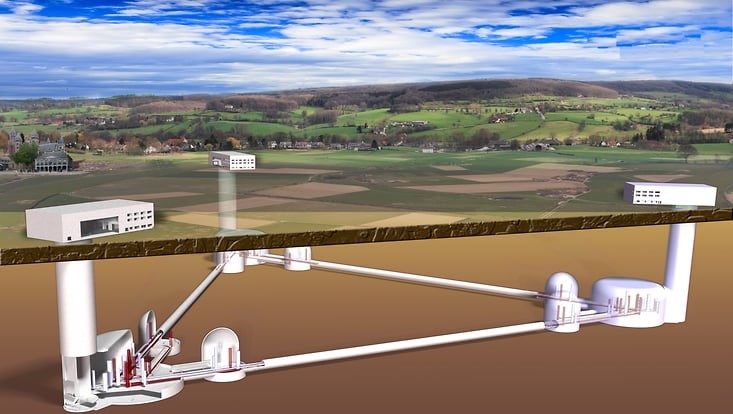Interview with Universität Hamburg’s Chief Digital Officer"Developing a Modern, Digital Vision for Universität Hamburg"
16 February 2021, by Tim Schreiber

Photo: Universität Hamburg / Hansen
With financing through the second funding line of the Excellence Strategy of the Federal and State Governments, Universität Hamburg appointed its first chief digital officer (CDO) at the beginning of 2021. In his interview, Dr. Sebastian Gerling talks about his tasks, objectives, and specific areas of focus.
Dr. Gerling, what does a CDO do?
There are many interpretations of the CDO role; it differs from organization to organization. At Universität Hamburg, I—together with all those involved—will develop a digitalization vision and a corresponding digitalization strategy. So, I have a coordinating role and have to consider where we as a university want to be in 5 to 10 years in terms of digitalization, as well as in terms of research, teaching, and administration.
My objective is to develop visionary ideas that also positively represent us outwardly. As CDO, I not only want to keep my finger on the pulse of technology but also want to see in which areas we, as a university, can do completely new things— things that no one else is doing, which could possibly set us apart us as a precursor.
How were your first few weeks in your new position?
Of course, for a start, it was about getting to know lots of areas and people. In the current pandemic, this means that I’ve been holding a lot of videoconferences in particular. I’ve been looking at the current state of digitalization and also talking about needs and wants. From that, I’ve been able to get an initial overall picture of things. However, my first impression is that the University is already well positioned in certain areas, has a computing center with a lot of expertise, and—through a lot of effort—has developed a good basis for a holistic and sustainable digital transformation. We first became aware of this during the pandemic, during which the switch to digital working and digital teaching worked out so well, despite the exceptional situation, thanks to the endeavor of all involved. However, we still have a long way to go to achieve a successful digital transformation based on a sustainable infrastructure.
Regarding your vision, are you taking all areas of the University into account?
Yes, it’s about all areas of the University and all cross-cutting issues. Alongside research, teaching, and administration, innovation and transfer play an important role. A university represents a significant challenge, because—as an institution—it is extremely diverse. For me, it is important that we develop shared goals for digitalization and factor in the interests and needs of the faculties, students, and employees. This is the only way that we’ll generate broad acceptance of the issue. Ultimately, it would be great to develop—together—a modern, digital interpretation of the University that is sustainably competitive and unique in Germany.
Do you have a favorite digital topic or an approach that is especially important to you?
For me, it’s important to understand that digitalization only works if users make use of the new features with excitement and conviction. We shouldn’t only digitalize processes in principle and construct a digital infrastructure; we should also place special focus on the user interface and try to design the applications to be as intuitive and as easy to use as possible. Today, children can already unlock smartphones from a very young age and operate them as a matter of course. In terms of usability, a lot has happened in the last few years, and I think that digitalization is achieved precisely at this interface.
What will the digital office you are setting up do?
I’m setting up a small team to support me with the development and implementation of the digitalization strategy. We will work closely together with actors from research, teaching, and administration—also with the new Smart Administration Unit, for instance. I’ve been delighted with the warm reception I’ve received during my first few weeks at Universität Hamburg. The work is a lot of fun. I’m looking forward to working with all colleagues and hope that, together, we can stabilize the strides made in digitalization—particularly those made in the last few years—and can achieve the University’s digital transformation with visionariness and success.
CV
Dr. Sebastian Gerling studied informatics at Saarland University in Saarbrücken. Following his master’s degree, he also completed his doctorate there in information security. From 2011, he was involved in establishing the CISPA Helmholtz Center for Information Security—one of the leading cybersecurity research centers in the world. On 1 January 2021, he became Universität Hamburg’s first chief digital officer (CDO).


